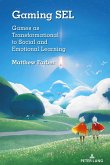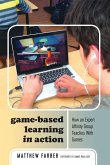Games enable children to practice emotions in spaces that are free from actualized consequences. With thoughtful guidance, games can help children manage emotions, perspective-take, demonstrate empathic concern, and exhibit prosocial behaviors.
Emerging research suggests that these competencies-also known as social and emotional learning (SEL) skills-are, in fact, teachable. In Gaming SEL: Games as Transformational to Social and Emotional Learning, Matthew Farber investigates the rich opportunities games have in supporting SEL skill development. Experts from the fields of education, game development, and SEL-including folks from CASEL, the Fred Rogers Center, Greater Good in Education, iThrive Games, Minecraft Education, and UNESCO MGIEP-share advice.
Games themselves cannot be responsible for children's learning. Having a supportive educator or caregiver guiding experiences can be crucial. This book also includes recommendations for embedding games in classrooms in ways that support meaningful SEL skill development. Regardless of your experience, content area, or grade level, this book is for you!
Emerging research suggests that these competencies-also known as social and emotional learning (SEL) skills-are, in fact, teachable. In Gaming SEL: Games as Transformational to Social and Emotional Learning, Matthew Farber investigates the rich opportunities games have in supporting SEL skill development. Experts from the fields of education, game development, and SEL-including folks from CASEL, the Fred Rogers Center, Greater Good in Education, iThrive Games, Minecraft Education, and UNESCO MGIEP-share advice.
Games themselves cannot be responsible for children's learning. Having a supportive educator or caregiver guiding experiences can be crucial. This book also includes recommendations for embedding games in classrooms in ways that support meaningful SEL skill development. Regardless of your experience, content area, or grade level, this book is for you!
"Matthew Farber's book gives the reader a compelling and nuanced tour of a very important subject-social and emotional learning and the role that games can play in supporting it. I would encourage anyone looking for a comprehensive and accessible introduction to this topic to read this book! I particularly appreciate Farber's broad knowledge of game design efforts in this area, as well as his grasp of related literature."-Katherine Isbister, Professor of Computational Media, University of California, Santa Cruz; author of How Games Move Us: Emotion by Design








